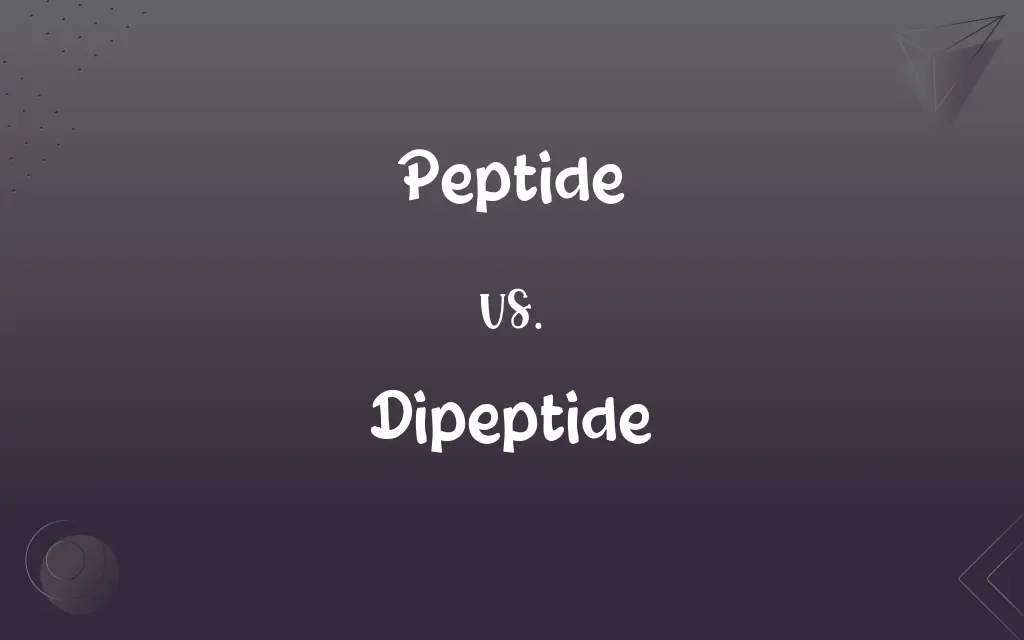Peptide vs. Dipeptide: What's the Difference?
Edited by Aimie Carlson || By Harlon Moss || Published on December 11, 2023
Peptides are chains of amino acids; dipeptides are the simplest peptides, consisting of just two amino acids linked together.

Key Differences
Peptides are chains of amino acids connected by peptide bonds. They are essential for various biological functions. Dipeptides, on the other hand, are the simplest form of peptides, consisting specifically of two amino acids linked by a single peptide bond.
In terms of complexity, peptides can range from small to large with varying numbers of amino acids. Dipeptides represent the most basic structure within the peptide category, containing only two amino acids.
Peptides play diverse roles in the body, including hormonal regulation, immune responses, and enzyme functions. Dipeptides, due to their simplicity, often serve as building blocks or intermediates in protein synthesis or degradation.
The synthesis process of peptides involves dehydration synthesis between amino acids. Dipeptides are synthesized through the same process, but only involve two amino acids forming a single bond.
In terms of applications, peptides are used in therapeutics, diagnostics, and research. Dipeptides, with their simpler structure, are often studied for their absorption and metabolism characteristics in pharmaceutical and nutritional research.
ADVERTISEMENT
Comparison Chart
Number of Amino Acids
Varies, can be many
Exactly two
Structural Complexity
Ranges from simple to complex
Always simple
Biological Functions
Diverse, including hormonal and enzymatic roles
Often serve as building blocks or intermediates
Synthesis Process
Involves linking multiple amino acids
Involves linking exactly two amino acids
Applications
Broad in therapeutics and research
Studied for absorption and metabolism in research
ADVERTISEMENT
Peptide and Dipeptide Definitions
Peptide
Peptides have therapeutic uses due to their biological activity.
Antimicrobial peptides are used in treating infections.
Dipeptide
Dipeptides often serve as intermediates in protein metabolism.
Glycylglycine, a dipeptide, is involved in various biochemical pathways.
Peptide
Peptides act as neurotransmitters and hormones in biological systems.
Endorphins, natural painkillers in the body, are peptides.
Dipeptide
Dipeptides are the simplest form of peptides in biology.
Carnosine, a dipeptide, is significant in muscle function and endurance.
Peptide
A peptide can be a precursor to a protein, consisting of fewer amino acids.
Collagen peptides help in skin elasticity and are used in beauty products.
Dipeptide
Dipeptides are studied for their role in pharmaceuticals and nutrition.
The dipeptide L-Alanyl-L-Glutamine is used in clinical nutrition.
Peptide
A peptide is a short chain of amino acids linked by peptide bonds.
Insulin, a hormone regulating blood sugar, is a small peptide.
Dipeptide
Dipeptides can be easily absorbed by the body, aiding in nutrition.
The dipeptide anserine is important in cognitive health and brain function.
Peptide
Peptides are fundamental components in cell signaling and function.
Glutathione, a peptide, plays a crucial role in cellular antioxidant defense.
Dipeptide
A dipeptide consists of two amino acids linked by a single peptide bond.
Aspartame, a sweetener, is a dipeptide of aspartic acid and phenylalanine.
Peptide
Any of various natural or synthetic compounds containing two or more amino acids joined by peptide bonds that link the carboxyl group of one amino acid to the amino group of another.
Dipeptide
A peptide that is composed of two amino acid molecules linked by a peptide bond.
Peptide
(organic compound) Any of a class of organic compounds consisting of various numbers of amino acids in which the amine of one is reacted with the carboxylic acid of the next to form an amide bond.
Dipeptide
An organic compound formed from two amino acids joined by a peptide bond.
Peptide
(chemistry) The peptide bond itself.
Peptide
Amide combining the amino group of one amino acid with the carboxyl group of another; usually obtained by partial hydrolysis of protein
FAQs
What roles do dipeptides play in the body?
Dipeptides serve as building blocks and intermediates in protein synthesis.
Can peptides form proteins?
Yes, longer peptides can fold into complex structures to form proteins.
What is a peptide?
A peptide is a chain of amino acids linked by peptide bonds.
How is a dipeptide different from a peptide?
A dipeptide is a simple peptide with exactly two amino acids.
Can dipeptides be synthesized artificially?
Yes, dipeptides can be synthesized in laboratories for research and pharmaceutical use.
Are all peptides biologically active?
Many peptides have biological activity, but not all.
How are dipeptides absorbed in the body?
Dipeptides are often absorbed more efficiently than individual amino acids.
Are dipeptides found in food?
Yes, dipeptides are present in many protein-rich foods.
Do dipeptides have nutritional value?
Yes, dipeptides can contribute to nutrition and are often easier to digest.
Are peptides naturally occurring?
Yes, peptides are naturally occurring biological molecules.
Do peptides have medical uses?
Yes, peptides are used in various therapeutic applications.
What is the difference in size between peptides and dipeptides?
Peptides vary in size, while dipeptides are always composed of just two amino acids.
Are peptides stable in products?
Peptide stability varies and depends on their structure and environment.
Can dipeptides enhance drug formulations?
Yes, dipeptides can improve drug stability and absorption.
Can peptides be used in diagnostics?
Yes, certain peptides are biomarkers in diagnostic tests.
What makes dipeptides simple?
Their structure, consisting of only two amino acids, makes them simple.
How do peptides interact with cells?
Peptides can interact with cell receptors and influence various cellular functions.
Are dipeptides used in supplements?
Yes, dipeptides like carnosine are used in dietary supplements.
Can peptides be allergenic?
Some peptides can trigger allergic reactions in sensitive individuals.
Do dipeptides play a role in flavor?
Yes, certain dipeptides contribute to the flavor of foods.
About Author
Written by
Harlon MossHarlon is a seasoned quality moderator and accomplished content writer for Difference Wiki. An alumnus of the prestigious University of California, he earned his degree in Computer Science. Leveraging his academic background, Harlon brings a meticulous and informed perspective to his work, ensuring content accuracy and excellence.
Edited by
Aimie CarlsonAimie Carlson, holding a master's degree in English literature, is a fervent English language enthusiast. She lends her writing talents to Difference Wiki, a prominent website that specializes in comparisons, offering readers insightful analyses that both captivate and inform.






































































